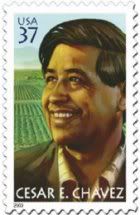 Today marks the anniversary of the birthday of one of America’s greatest civil rights leaders, César Chávez (1927-1993). Across the world, the legacy of a man who spent his entire life fighting against the injustices saddled on the shoulders of hardworking people will be celebrated and honored.
Today marks the anniversary of the birthday of one of America’s greatest civil rights leaders, César Chávez (1927-1993). Across the world, the legacy of a man who spent his entire life fighting against the injustices saddled on the shoulders of hardworking people will be celebrated and honored.
He was a posthumous recipient of the Presidential Medal of Freedom in 1994 under the Presidency of Bill Clinton and was nominated for a Congressional Gold Medal in 2004 by leaders of the Democratic Party. Buildings, schools and streets across the United States have been renamed in his honor.
Here in Tucson, the city government is considering an official holiday to commemorate and honor his mission. Even the U.S. Congress has a bill calling for a federal holiday, which is probably collecting dust somewhere in Speaker Hastert’s office.
So who was this humble man on a mission of justice?
sígame…
Born in 1927, César learned at a young age what it was like to be a victim of society. From his Wikipedia entry:
Known primarily for his work in organizing the United Farmworkers Movement, César followed in a long line of historical figures who adhered to the nonviolent method of protest and activism. He empowered everyday workers to take a stand for their rights, organizing widespread marches and boycotts that allowed their calls for justice to be heard and joined across America. He also showed the corporate masters that he believed in his mission by engaging in multiple hunger Fasts for Life.
Thirty-six days. A testament to the power of the human will when the entire “body, mind and soul” are united for a common cause – or causa, as it is known in the Xicano community.
Seeing images and video of hundreds of thousands of people marching and students walking out of their classrooms to join in solidarity the past few weeks has been breathtaking. Much hay has been ordered by conservative talking-heads to water down the power of these demonstrations of unity and comunidad by their touting of César’s opposition to illegal immigration during his years of activism. From the 3/27/06 transcript of CNN’s Lou Dobbs Tonight:
By the way, The Pew Hispanic Center bore out Cesar Chavez’s views last year with a study that showed that of two million Hispanic illegal immigrants into this country, those who lost their jobs as a result, were the most recent Hispanic immigrants into this country. A difficult, difficult complex issue. In one that, could it seems to me, be far better represented by the elected officials, certainly in Los Angeles.
Now would be a good time to mention that L.A. Mayor Antonio Villaraigosa joined his people in the march for justice last Saturday. He has also met with students this week to address their concerns at seeing the U.S. Congress consider making their friends and family members felons overnight; finishing with a stern plea for them to return to their classrooms to discuss the issue.
People like Lou Dobbs and Michelle Malkin have no credibility to dictate what Latino leaders believe. To get the facts, it’s best to go straight to the source. In this case, The Cesar E. Chavez Foundation should be a good starting point.
Download it Today! (.pdf file)
The curriculum activity found at the download link should put that particular right-wing talking-point to a quick death.
César was indeed an opponent of illegal immigration, but he was also vehemently opposed to the enslavement of workers by corporate greedmongers who worship at the altar of the Almighty Dollar. To suggest that he would support draconian bills like HR4437 if he were alive today shows a gross disconnect to understanding the legacy of Chavez’s mission, summed up today by Senator Ken Salazar (D-CO)’s reciting of one of César’s personal prayers on the floor of the Senate.
Show me the suffering of the most miserable;
So I will know my people’s plight.
Free me to pray for others;
For you are present in every person.
Help me take responsibility for my own life;
So that I can be free at last.
Grant me courage to serve others;
For in service there is true life.
Give me honesty and patience;
So that I can work with others workers.
Bring forth song and celebration;
So that the Spirit will be alive among us.
Let the Spirit flourish and grow;
So that we will never tire of the struggle.
Let us remember those who have died for justice;
For they have given us life.
Help us love even those who hate us;
So we can change the world.
Take some time today to remember César’s long legacy of promoting justice and human dignity. He was able to reawaken the conscience of the people through a combination of organizational power and personal humility that can easily be replicated today if we believe and hope in the collective strength of la causa de paz y justicia. It can be done. ¡Sí, Se Puede!